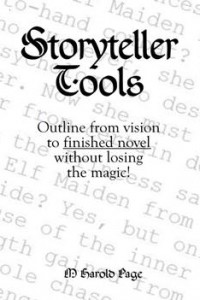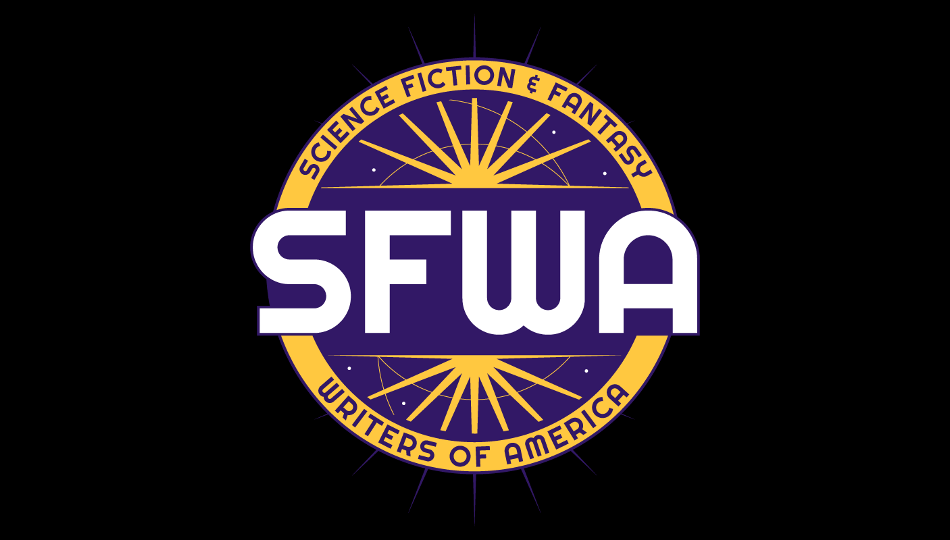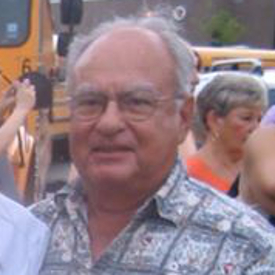 M. Harold Page is a swordsman, an author, a self-confessed geek, and a father. As biographies go it’s both modest and compelling, like his writing itself – you always want more. So, I’m going to try to fillet out a little more information about the man, the myth, the mayhem maker (in his books only, I trust, not in real life) for Amazing Stories readers.
M. Harold Page is a swordsman, an author, a self-confessed geek, and a father. As biographies go it’s both modest and compelling, like his writing itself – you always want more. So, I’m going to try to fillet out a little more information about the man, the myth, the mayhem maker (in his books only, I trust, not in real life) for Amazing Stories readers.
It turns out his full name is Martin Harold Page. He goes under M. Harold Page to avoid confusion with an English country singer and a French writer of angsty YA. He’s married with two kids, lives in Edinburgh, Scotland where he helps to run the Dawn Duellist Society, a club entirely devoted to Historical European Martial Arts. Originally a technical author, he has been a full time writer and house husband since the economy ate his day job a couple of years ago.
John Dodds for Amazing Stories Magazine: One of the things that fantasy authors need to get right, apart from creating an authentic feel for the cultures and conflicts they write about, is battles. So how did you become so immersed in learning swordfighting?
M. Harold Page: Short answer – As a young man, I met the Dawn Duellists Society in the pub and thought, “I should train with them for a year so I can write good fight scenes.” A decade and a half later, I have a sword scar, a battered suit of armour and I teach German Longsword every week.
Long answer- I’ve always been a howling medievalist. As an 11-year-old kid, I  dragged my family around every major castle in North Wales over a one-week holiday: Harlech, Conway, Caernarvon, Rhuddlan, and Dolwyddelan as a bonus. This entailed going up every tower and reading every word in the old fashioned guidebook. I also spent hours churning up the lawn fighting with wooden swords, and more hours reading writers like Ewart Oakshott and Ronald Welch. Looking back, it’s impossible to untangle whether I like the middle age because swords, or the other way around.
dragged my family around every major castle in North Wales over a one-week holiday: Harlech, Conway, Caernarvon, Rhuddlan, and Dolwyddelan as a bonus. This entailed going up every tower and reading every word in the old fashioned guidebook. I also spent hours churning up the lawn fighting with wooden swords, and more hours reading writers like Ewart Oakshott and Ronald Welch. Looking back, it’s impossible to untangle whether I like the middle age because swords, or the other way around.
These days, I regularly fight with a replica of the Sword of Battle Abbey, a weapon I used to sketch in the Royal Scottish Museum when I was a kid.
ASM: And how does what you learn inform your books?
MHP: Well, apparently – according to one review – my fight scenes trigger your mirror neurons. What I learn, what I’ve experienced, makes swords real to me.
I’m not by any means the best fighter, even in the class I teach. However I know what fighting is like, how people move, respond, and how all the little wounds would add up. I also know what it’s like to be in a melee in armour, and feel the weapons clash on your plates. (I hasten to add that I am fortunate that the ball-gripping visceral experience of real combat is something I have to extrapolate from books such as “On Combat”.)
Most importantly, I know my characters’ options in any given tactical situation I throw at them and can make them respond in character and realistically. There’s no need to resort to a handful of sand to the eyes, or cute tricks with furniture.
ASM: You write in franchised universes, mainly, such as the Foreworld Saga, set in the 13th century. Tell us how that came about and which other series you write about.
MHP: Both gigs Foreworld and Paradox Interactive came about through medieval sword fighting.
Top tip to wannabe writers; heed the song of steel and Google “HEMA” and your area.
Seriously! One was a lead from somebody who once taught me, the other from somebody I once taught. The thing about swordsfolk is that we often have interesting jobs, or at least interesting friends. Having an agent validated me as a professional, got me an audition, and – as if by magic – the “technical” dropped off my job description leaving plain “author”.
ASM: You make the fair point that writing for licensed worlds isn’t hack (or should that be “hack and slash”?) work, but a perfectly honourable profession. Tell us what’s in it for a writer who gets the chance to do this, and what do you in particular enjoy and appreciate about it?
MHP: The thing about writers is that we write. It’s not just our hobby, it’s our passion and our spiritual practice. We do it for the love of it. The point about being paid is not that it provides an extrinsic reward, but rather that it lets us write fiction rather than – say – work on technical manuals in order to pay the bill. It follows that almost any paid fiction gig is good and that a gig where you get paid to write something you’d write anyway is a kind of personalised heaven.
Franchise work has several professional advantages. Marketing-wise, it lets you punch above your weight, riding on the back off the established franchise. It can work on awesomely short cycles. Normally novels take years to come out; it’s all to do with marketing slots and publishers pushing out books in ways that wont’ compete with each other. This can also be true of franchise fiction, but in my case my books were appearing mere months after I handed them in. Then…well it’s back to cash. Franchise work tends to pay a good advance upfront, and the balance on completion. If you’re just starting out, that’s a godsend. There’s also usually some kind of royalty system to keep you interested in promoting the book, and as a kind of performance related pay.
The downside, of course, is that the publisher owns your book and the characters. I can only write about Sir Jack Rose if Paradox want me to, and – in theory at least – they could hand off the characters to somebody else.
From a writing point of view, franchise work is great fun. Creativity doesn’t thrive in a vacuum, so having something to bounce off can be a real bonus. It’s also nice being handed a pre-made story world without having to worry about plausibility or originality. It’s a bit like those writing exercises you’d do in highschool: “Vikings. York. GO!!!”
(My son, “Kurtzhau” would say that the main advantage to a writer’s child is that I had to upgrade our family PC so it could play modern games.)
ASM: The Mongoliad series (of which Foreworld is a part) has had work in it by the likes of Neal Stephenson and Greg Bear, as well as associated film and game projects. Where does your work fit in?
MHP: My William Marshal versus the Assassins story is very much a SideQuest, set in the world and continuity of the Mongoliad, but not impacting on the main thrust of the story.
Really, it’s just a crusader adventure yarn with secret societies, kind of Harold Lamb does Name of the Rose. What was cool was taking William the Marshal, probably the greatest knight of them all and my childhood hero, and filling in his missing two years in the Holy Land. (One Amazon review praised me for inventing him! Ha!)
ASM: Are all of your projects based around historical settings (I’m thinking of War of the Vikings, among others)? And do you see them as pure fantasy or historical fantasy, because I understand there is a distinction to be made, though please argue to the contrary if you wish?
MHP: History is where I live creatively. However, I use Fantasy to play with history on the grand scale, exploring the implications of historical world views and historical forces. It also lets me tool up cultures with magic and steampunk then make them fight. It’s a bit like being Brian Blessed in the “Flash Gordon” movie…
This is why my agent is currently shopping around a big fat fantasy novel in which time travelling 30s-style communists invade their own medieval past not realising the magic works…. I got to write some interesting knights versus tanks battles, and a sword fight on a zeppelin.
I see my published projects to date as just good old fashioned Historical Adventure, though my Foreworld one dovetails into a larger story world that does contain fantasy elements if you look at it from the right angle.
ASM: Research. I know you do a huge amount of that, and you have tons of useful and informative articles on your blog, useful not only for writers but for anyone with an interest in history at all. How much research does it actually take to write a persuasive fantasy/historical fantasy? I ask because you talk about this very thing in your excellent non fiction work, “Storyteller Tools: Outline from vision to Finished Novel Without Losing the Magic!”
MHP: Wow. Good question. Damned if I know! I’ve been reading history since I was able to read, and adult history books and original sources since a few years after that. I read Malory’s Le Morte De Arthur in the original Medieval English while still in what Americans call Middle Grade. Needless to say, most of my formal education has also involved history. This means I have the context for most eras I’d ever want to write in and – more importantly – a sense of how people work in pre-modern settings.
Specifically, each of my books took about a month of research, but layered. I write from outline, spinning increasingly detailed retellings of the same story. So the first layer of research is the strategic stuff, things you need to know to weave any kind of story specific to a milieu; factions, wars, battles, culture, social structure, economy… all broad brush. Then as a story firms up, you get the next layer… call it operational. You need to know how the battles went, what the practicalities of travel were and so on. Finally, as you draft, you need the tactical stuff. What the costume was like, how the building interiors were laid out, how to start a fire… all the stuff living history enthusiasts can tell you.
Best way to explain this; imagine it was a story about a late medieval merchant:
-Strategic level, you need to know that merchants existed, what they traded in and where they travelled. Once you have that, you can start to think about stories.
-Operational level, as the story takes for, you need to know that merchants couldn’t take their own guard across other people’s territory and had to rely on escorts from the local barons. You would also need to know, for example, that they could stay in a network of inns.
-Tactical level, drafting a chapter, you need to know the inn’s ground plan, the weapons people fought with, the combat style of the protagonist.
ASM: One of my favourite writers, another British one, M. John Harrison, talks very critically about worldbuilding. He says: “worldbuilding is not technically necessary. It is the great clomping foot of nerdism” and that “every moment of a science fiction story must represent the triumph of writing over worldbuilding.” What’s your view on that?
MHP: Um. No. Yes. Kind off.
First, worldbuilding and storytelling are the same thing. Nothing that’s not story belongs in the, um… story. So for me it’s a false antithesis.
Second, worldbuilding is an aspect of storytelling in the same way that characterisation is. Even if you don’t go about it directly and consciously, it’s still something you need to keep an eye on. Otherwise you end up with Edgar Rice Burroughs’s radium rifles.
The radium rifles seemed like a good idea when ERB wrote the first Mars novel; exotic atomic small arms that could hit a target at extreme range. However he pretty soon discovered he was writing—inventing, really—the Swords and Planets genre, and this only worked if he ignored the damned rifles.
ASM: I earlier mentioned your book, “Storyteller Tools: Outline from vision to Finished Novel Without Losing the Magic!” Wasn’t it a bit hubristic writing such a work only a year or so into your professional career? Can you tell us a bit about the book?
MHP: Hubristic? Yes. I regularly have to dodge lightning bolts sent by the angry gods.
 Joking aside, I did agonise over it. However, I decided it was OK because other slightly less junior people were already churning titles like “Write faster for money and profit” and “100000 things you need to know about writing”, because I was specifically offering tools that worked for me, rather than general literary advice, because I did write four books last year and people kept asking me how I did it, and because – ultimately – I wanted a new sword and this would let me pay for it.
Joking aside, I did agonise over it. However, I decided it was OK because other slightly less junior people were already churning titles like “Write faster for money and profit” and “100000 things you need to know about writing”, because I was specifically offering tools that worked for me, rather than general literary advice, because I did write four books last year and people kept asking me how I did it, and because – ultimately – I wanted a new sword and this would let me pay for it.
The main thing about my storytelling tools is that they let you see your story’s structure as you build it so you can then respond to it creatively rather than with reference to “1001 stupid mistakes failed writers make” and “A gazillion bewildering tips for nube authors”. The tools really come into their own when you are starting off with a vague vision, or in my case, a setting and theme dictated by a franchise. You can go from, what’s cool? to a writeable outline in a matter of hours or days.
ASM: Can you say what you’re currently working on?
MHP: Stuff. Lots of it. I have invites to write short stories. I’m pitching for a gaming-related project. Meanwhile my agent is hard at work trying to get me more franchise gigs.
He’s also shopping two novels of mine: “Shieldwall: Barbarians!” a swashbuckling high-bodycount YA Dark Age yarn set during the fall of the Roman Empire aimed primarily at 12-year-olds who’ve played too many inappropriate video games; and “Tides of Metal”, that slightly bonkers diesel punk versus heroic Fantasy pit-fight I talked about. If either sticks, then I’ll be working on a series for the foreseeable future.
Other than that, I’m working on raising geeky children and teaching modern folks to fight with medieval swords.
M Harold Page is a Scottish-based writer and swordsman with several Historical Adventure franchise books in print. His creative writing handbook, Storyteller Tools is available on Amazon. If you live near Edinburgh, Scotland, he would love to teach you how to fight in Medieval German Longsword style.








